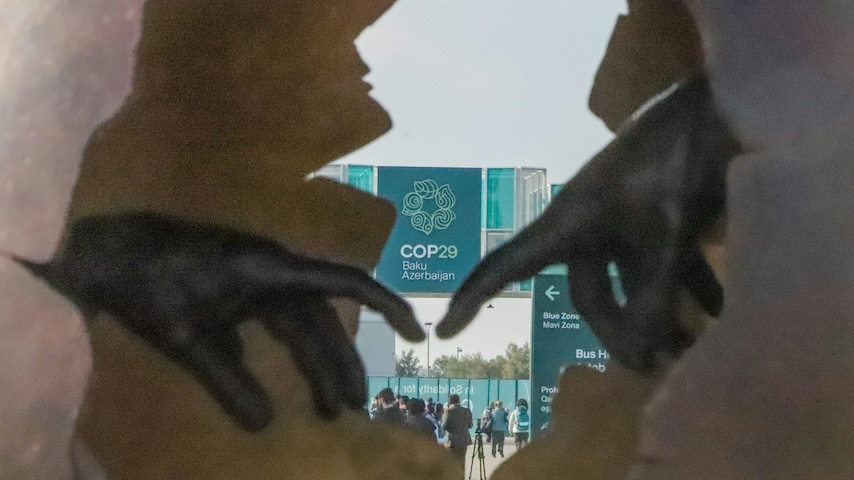COP29 Looked Like the Beginning of the End, Only There’s Nothing Else Out There
Photo by Matthew TenBruggencate/Unsplash
In the end, no one was happy. The U.N. climate talks known as COP29 did deliver an overtime agreement, including a new climate finance goal that was the centerpiece of the negotiations, but it was so frayed and ugly and disastrously unambitious that it may as well have produced nothing at all.
“This document is little more than an optical illusion,” said Chandni Raina, India’s lead delegate, after the final decision was gaveled in. “This, in our opinion, will not address the enormity of the challenge we all face.” The topline result is the New Collective Quantified Goal, or NCQG, on international climate finance: rich countries have pledged to deliver $300 billion per year to the developing world, by 2035. This barely ekes past inflation over the previous pledge of $100 billion made way back in 2009, falls disastrously short of the $1.3 trillion or more that is generally agreed to represent the actual need, and it contains all sorts of caveats about where the money will actually come from. “It is a paltry sum,” Raina said.
Added the Center for Biological Diversity’s senior climate campaigner Ben Goloff, “The gap between this climate finance commitment and what’s needed is so big you could see it from space.”
The COPs have felt like failures before, of course, with the dithering of a world addicted to fossil fuels angering activists the world over. But this time something felt different. Amid calls from high-level officials to reform the entire process, there seems to be a sense that this may actually be worse than the alternative — nothing.
“The climate summit in Baku was not a success, but at best the avoidance of a diplomatic disaster,” said Ottmar Edenhofer, a climate economist and co-director of the Potsdam Institute for Climate Impact Research in Germany, in a statement. “It is now abundantly clear that we need additional negotiation formats for the global fight against the climate crisis.”
Along with India, countries including Nigeria, Malawi, and Bolivia have rejected the deal. The quotes from various developing countries sound like the end of something. “The commitments made in Baku — the dollar amounts pledged and the emissions reductions promised — are not enough. They were never going to be enough,” said Ralph Regenvanu, Vanuatu’s special envoy for climate change and environment, in a statement. “And even then, based on our experience with such pledges in the past, we know they will not be fulfilled.”
This is the result of a flawed process and disastrous decisions. There was no real reason to allow three straight COPs to be hosted by countries (Egypt, the United Arab Emirates, and Azerbaijan) heavily reliant on their fossil fuel income, a scenario that while impossible to quantify undoubtedly influenced global progress; there was no law mandating thousands of oil and gas lobbyists be permitted to roam the halls. People made these processes, and people have allowed them to break and crumble.
“Multilateralism as a whole is under threat,” one expert told Reuters. That’s the post-COP vibe, that the entire concept of a 200-country, consensus-based approach to fighting climate change is teetering. “This process was chaotic, poorly managed, and a complete failure in terms of delivering the ambition required,” said Panama’s climate envoy Juan Carlos Monterrey.
When just a few countries — Saudi Arabia chief among them, though with an assist from the host country itself — can rampage through a COP and more or less undermine the whole thing, it’s probably time to go. Only, what else is there? The understanding has long been that this is a global issue — once the CO2 goes up there, regardless of its origin, it’s everyone’s problem — and thus needs a global solution. Only, here we are, 29 years in: If the COPs were going to fix climate change, they would have fixed climate change.
As the calls to overhaul show, there are other ideas out there; the shorthand for them, though, is “end the COP process.” “Not all of the almost 200 signatory states to the UN Framework Convention on Climate Change necessarily have to sit around the same table for progress to be made,” said Edenhofer, of the Potsdam Institute. There is an obvious logic to this: if the Saudi Arabias of the world bring a wrecking ball to the big COP table, leave them to swing it back and forth at nothing and get things done elsewhere. It is, in some ways, the way the world’s actual climate progress has occurred, with some countries, states, and cities managing varying degrees of an energy transition, without true global top-down mandates or enforcement.
But even as the delegates head home and leave vapor trails of anger and derision in their wake, there are calls for the next COP host, Brazil, to try and repair what the last few years have broken. While tinkering around the edges is useful and may well be the major engine of an eventual transition, even the biggest critics can’t seem to fathom giving up on the U.N. process entirely.
“Countries seem to have forgotten the reason why we are all here,” said Tina Stege, the Marshall Islands climate envoy, in a statement. “It is to save lives. It is to save lives. We have to work hard to rebuild trust in this vital process.